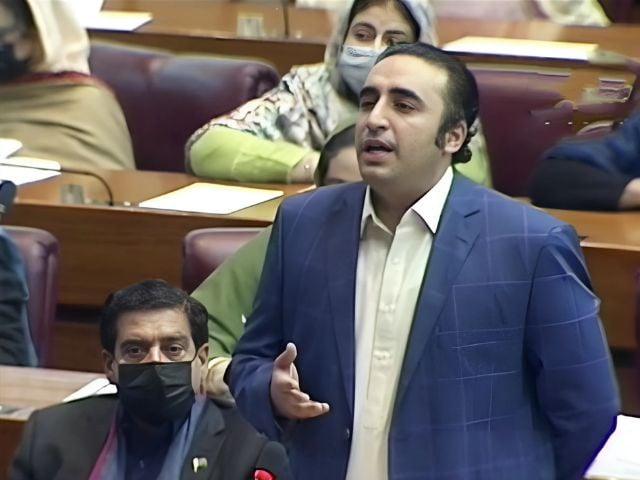The president of the Pakistan Peoples Party (PPP), Bilawal Bhutto Zardari, said India a “terrorist nation” and urged the neighboring country to choose between dialogue or destruction in the current situation.
In a statement released on Tuesday in the National Assembly, former Minister of Foreign Affairs Bilawal, reiterated that Pakistan clearly indicated to the world, including India, that he has no involvement in the recent incident of Pahalgam. He added that India was going to blame for his own incompetence on Pakistan.
“Pakistan does not bow,” said Bilawal. “Our nation was founded by the struggle, and the struggle of the Pakistani people will continue. A bloodbath is unleashed at the occupied cashmere, where terrorism sponsored by the state of India is at its peak. India must stop its atrocities against the cashmiris.”
Zardari also said that India’s allegations against Pakistan as part of the Pahalgam incident, as well as threats, are not founded. “I mean clearly to the world that Pakistan has had no involvement in Pahalgam’s incident. Pakistan is the most affected by terrorism. We have condemned all forms of terrorism, and we are victims of it,” he said.
The PPP president has also said that Pakistan has shown the world that India is a “terrorist nation”, presenting evidence of terrorism supported by Indians through countries like Sri Lanka and Canada. He accused the Indian government of having acted irresponsibly.
During his speech, Zardari also said that the armed forces of Pakistan were on alert to defend the country, declaring: “India must remember that the Pakistani nation will never bow against anyone. He must choose between dialogue or destruction.” He warned India that any assault would be met with a strong response from Pakistan soldiers, with the full support of the nation.
Zardari concluded by reaffirming the unity of the Pakistani people, saying: “Whether it is the Sindhi, Punjabi, Pachtoune, Balutch or Cashmere, we are all Pakistanis first. We will answer like one, with a heart, a spirit and a unified fist.”
He also condemned India’s actions concerning the Industry Water Treaty, qualifying his suspension a crime against humanity. “The whole nation is united to face India. Our armed forces are fully ready to respond to any form of attack,” he said.
Tensions between India and Pakistan reached new heights following a fatal attack on April 22, 2025, when 26 men were killed on a tourist site in Pahalgam, in Indian, illegally occupied Jammu and Cashmere (iiojk). India quickly blamed the Pakistani elements for the attack, but no evidence was presented to support the complaint, which Islamabad vehemently denied.
In response to the attack, the security committee of the Cabinet of India approved several reprisal measures on April 23, including the closure of the Wagah-Attari land transport point, a travel notice urging Indian nationals to avoid Pakistan, an official notification of the suspension of the Industry Water Treaty and the revocation of several categories of visa for Pakistan.
On April 24, the National Security Committee of Pakistan (NSC) issued a severe warning, declaring that any attempt by India to block the flow of water in Pakistan would be considered an act of war. The NSC has also approved the closure of the Wagah border passage.
The next day, on April 25, the Pakistani Senate unanimously adopted a resolution rejecting the allegations of India concerning Pahalgam’s attack, calling them baseless and politically motivated.
Tensions also intensified on April 26, when the Pakistani High Commissioner in London was vandalized during a demonstration of hundreds of pro-India and Pro-BJP demonstrators.
The demonstrators caused hardware damage, including broken windows and paint splashes with saffron. Pakistan accused India of encouraging violence, the Federal Minister of Information Attaullah Tarar condemning acts as being supported by “the Indian state and the agencies”. British police then arrested two people suspected of participation in the incident.




